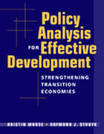Sort by: Author | Title | Publication Year
BOOKS
Policy Analysis for Effective Development: Strengthening Transition EconomiesKristin Morse and Raymond J. Struyk This practical text provides analytic tools and real world examples to equip both students and professionals with the skills they need to develop—and implement—effective public policies.
Focusing on transition economies, Morse and Struyk concentrate on the day to day tasks involved in tackling social and economic policy issues. They thoroughly cover the practicalities of More > |  |
Maghrebian Mosaic: A Literature in TransitionMildred Mortimer, editor Albert Memmi published the first anthology of francophone Maghrebian literature, he expressed his unhappy belief that francophone writing would quickly be eclipsed by Arabic. To the contrary, this volume demonstrates that the francophone writing of North Africa remains vibrant and prolific.
Two distinct periods are evident in contemporary Maghrebian letters, producing the anticolonial works More > |  |
African Development: Making Sense of the Issues and Actors, 3rd editionTodd J. Moss and Danielle Resnick Both authoritative and accessible, African Development introduces the issues, actors, and institutions at play in development trajectories across sub-Saharan Africa.
This new edition, thoroughly updated, includes an entirely new chapter devoted to key demographic trends in the region, especially rapid urbanization and the distinct "youth bulge." There is also a review of major More > |  |
Mexico’s Left: The Paradox of the PRDDag Mossige Why has Mexico's political left been in such turmoil since the dramatic 2006 election? What explains the contentious relationship between the country's largest left-wing party, the PRD, and its former presidential candidate Andrés Manuel López Obrador? Is the PRD in fact a political party, or instead a much looser political movement? Dag Mossige provides an insightful More > |  |
Explaining Foreign Policy: International Diplomacy and the Russo-Georgian WarHans Mouritzen and Anders Wivel Why would Georgia attack South Ossetia in August 2008, with Russian forces conducting exercises nearby? This remains a puzzle to analysts—on a not inconsiderable list of foreign policy puzzles. Hans Mouritzen and Anders Wivel use the example of the Russo-Georgian war to illustrate and evaluate their original model for explaining foreign policy behavior.
The authors apply the model to the More > |  |
Homeland Security Intelligence: Where We Are, How We Got Here, What Lies AheadWesley R. Moy and Kacper T. Gradoń What is the role of intelligence in the homeland security enterprise? How have its practice and function evolved since the creation of the Department of Homeland Security more than two decades ago? What accounts for the changes? As they address these questions, the authors of this comprehensive volume investigate the critical issues that remain unresolved and consider what lies ahead. More > |  |
Islamism: A New TotalitarianismMehdi Mozaffari What exactly is Islamism? And what explains its violent expansion in recent decades? Why are Islamists so determined to change the world order? Are there similarities between Islamism and classical totalitarian regimes and ideologies? Will it fail, as those regimes did in Nazi Germany and the Soviet Union—or can it adapt effectively to changing realities? What are the fundamental strengths More > |  |
Africa in the Global EconomyRichard E. Mshomba Choice Outstanding Academic Book!
This in-depth analysis of the role of international trade in Africa focuses on four central issues: the trade policies of the sub-Saharan African countries; the impact of GATT and its successor, the World Trade Organization; the impact of specific GATT/WTO agreements; and the viability of regional economic integration as a strategy for trade and More > |  |
Globalization and Social Exclusion: A Transformationalist PerspectiveRonaldo Munck When global economies integrate, what disintegrates as a result? The answer, Ronaldo Munck contends, is social equality.
To illustrate how globalization deepens existing inequities, Munck focuses on disparities in living conditions; the feminization of poverty; the global sex trade; the effects of racism, migration, and multiculturalism; and the formation and political manifestations of social More > |  |
Domestic Politics and Drought Relief in Africa: Explaining ChoicesNgonidzashe Munemo Ngonidzashe Munemo challenges the conventional wisdom that African governments lack the technical capacity and political will to respond to drought and the threat of famine.
Through a comparative analysis of three politically disparate countries—Botswana, Kenya, and Zimbabwe—Munemo demonstrates that differences in the ways that governments face similar drought-induced food crisis More > |  |



